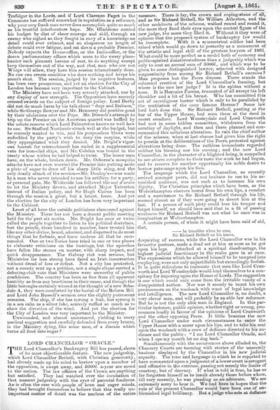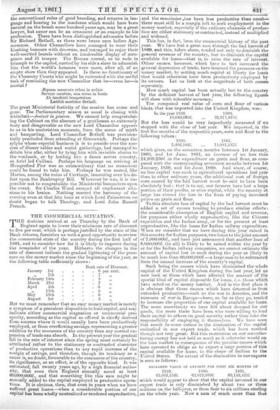LORD CHANCELLOR "ORACLE."
THE Lord Chancellor's Bankruptcy Bill has passed, shorn of its most objectionable feature. The new judgeship, which Lord Chancellor Bethel!, with Christian generosity, bad already made up his mind to bestow upon a member of the opposition, is swept away, and 5000/. a-year are saved te the nation. The law officers of the Crown are anything but satisfied. They had watched over the incubation of that nascent judgeship with the eyes of parental fondness. As is often the case with people of keen and eager minds, they had brought themselves to believe that this really un- important matter of detail was the nucleus of the entire measure. There it lay, the crown and coping-stone of all, and as Sir Richard Bethel, Sir William Atherton, and the other architects of the scheme, walked round and round it, the more they fixed their eyes upon the central figure of the new judge, the more they liked it. Without it they were of opinion that the proposed system of bankruptcy law would be incomplete. With it a symmetrical edifice had been raised which would go down to posterity as a monument of the artistic and legal skill of the greatest lawyers of 1861. What could be more perfect as a model both of economy and public-spirited disinterestedness than a judgeship which was only to cost an annual sum of 50001., and which was to be given to some distinguished lawyer, selected with designed magnanimity from among Sir Richard Bethell's enemies ? Man proposes but the Peers dispose. There stands the columnal erection of the Lord Chancellor's framing, but where is the new law judge ? It is the sphinx without a nose. It is Hercules Furens, truncated of all except his left shoulder and a bit of his breast. Who has committed this act of sacreligious horror which is only to be paralleled by the mutilation of the once famous Hermm ? Some law lord bath done this. Sir Richard Bethel, panting at the bar of the Upper House, had seen them at the deed in se ref. conclave. Lord Wensleydale and Lord Cranworth had met in some hidden committee, withdrawn from the scrutiny of daylight, and then and there planned and con- summated this nefarious alteration. In vain the chief author of the scheme, when at last chance had given him the right to preside at the deliberations of the Peers, protested against alterations being done. The ruthless iconoclasts regarded neither his blessinec' nor his cursing ; and the new Lord Chancellor, in the character of a blighted being, is compelled to see others complete to their taste the work he had begun, and to reserve for another opportunity his noble desire to bestow patronage upon his foes. The language which the Lord Chancellor, so recently arrived amongst peers, did not hesitate to use to his as- tonished audience, was not such as to increase his own dignity. The Christian principles which have been, as the Wolverhampton electors learnt from his own lips, a comfort and a sustenance to Sir Richard Bethel through his life, seemed almost as if they were going to desert him at the last. If a person of such piety could lose his temper and forget himself, we should have said that in a fit of passing weakness Sir Richard Bethel was not what he once was in imagination at Wolverhampton. A certain person, of whom it might have been said of old, that, he trembles when he sees,
Sir Richard Bethell on his knees,
despairing of success, while the Lord Chancellor was in his favourite posture, made a dead set at him as soon as he got upon his legs. Attacked at a spiritual disadvantage, the highest judicial functionary in the realm gave in at once. The expressions which he allowed himself to be tempted into employing, were not only unjustifiable but exceedingly foolish. It is quite ridiculous to insinuate that men like Lord Cran- worth and Lord Wensleydale would lend themselves to a con- spiracy for imposing upon the House of Lords. The suggestion is one which could only come from the irritable vanity of a disappointed author. Nor was it seemly to taunt his own predecessors on the woolsack with want of legal knowledge and intelligence. The new Lord Chancellor is, no doubt, a very clever man, and will probably be an able law reformer. But he is not the only able man in Ebgland. In this par- ticular instance, public opinion, whether right or wrong, pro- nounces loudly in favour of the opinions of Lord Cranworth and the other opposing Peers. It little beseema the new Lord Chancellor under such circumstances to enter the Upper House with a sneer upon his lips, and to take his seat upon the woolsack with a crow of defiance directed to his au- dience and the public : "I am Lord Chancellor Oracle, and. when I ope my mouth let no dog bark." Simultaneously with the occurrences above alluded to, the Chancery Courts are teeming with stories of the unseemly hauteur displayed by the Chancellor in his new judicial capacity. The tone and language in which he is reported to have commented upon a judgment of a lower court is arrogant and offensive in the extreme, passing not merely the limits of courtesy, but of decency. If what is told is true, he has so far forgotten himself as to insult already those before whom, till very recently, he was pleading as an advocate. We are extremely sorry to hear it. We had been in hopes that the rule of the present Chancellor would have been one of un- blemished legal brilliancy. But a judge who sets at defiance the conventional rules of good breeding, and returns in lan- guage and bearing to the insolence which would have been natural on the bench some hundred years ago, may be a great lawyer, but neyer can be an ornament or an example to his profession. There have been distinguished advocates before Sir Richard Bethel], as there were brave men before Aga- memnon. Other Chancellors have managed to wear their blushing honours with decorum, and managed to enjoy their well-merited laurels without an intolerable display of arro- gance and ill temper. The Roman consul, as he rode in triumph to the capitol, carried by his side a slave to admonish him that the world's honours were more, after all, of an empty show than they appeared. Is there no functionary of the Chancery Courts who might be entrusted with the useful task of reminding the new Chancellor that he—even he—is mortal Aquam memento rebus in arduis Servare menfem, non secus in bonis Ab insolenti temperatam Lntiti moriture Bethel!.
The great Ministerial festivity of the session has come and gone. The Parliamentary season as usual is closing with whitebait—desinit in piscem. We cannot help congratulat- ing the Cabinet on the absence of a gentleman go extremely testy and disagreeable as the new Lord Chancellor appears to us in his unchristian moments, from the scene of mirth and banqueting. Lord Chancellor Bethel' was providen- tially precluded from attending at Greenwich. Perhaps the sylphs whose especial business it is to preside over the sue- eess- of dinner tables and social gatherings, had managed to detain him afar, either by tying him with invisible chains to the woolsack, or by leading him a dance across country, as Arid l led Caliban. Perhaps his language on arriving at Hungerford Pier was so extraordinary that no steamboat could be found to take him. Perhaps he was seated, like Marius, among the ruins of Carthage, lamenting over his de- feat upon the Bankruptcy Bill. Wherever he was, it is im- possible not to congratulate the Ministerial banqueters upon the event. Sir Charles Wood escaped all unpleasant allu- sions to his brains,. Nothing marred the harmony of the evening even at that late hour at which Lord Pahnerston no doubt began to talk Theology, and Lord John Russell French.































 Previous page
Previous page